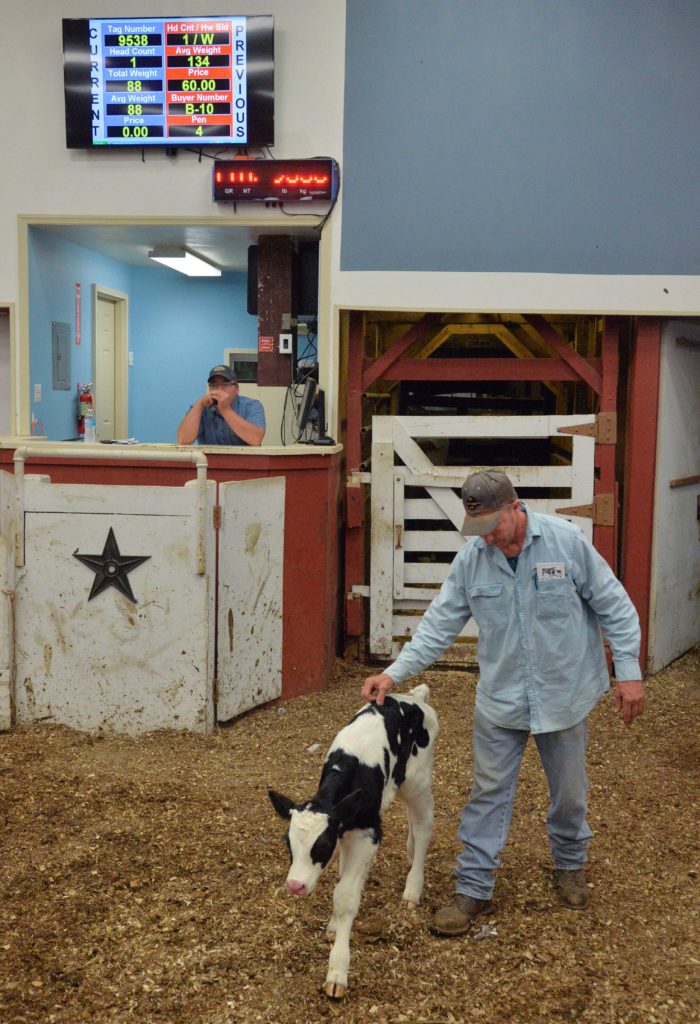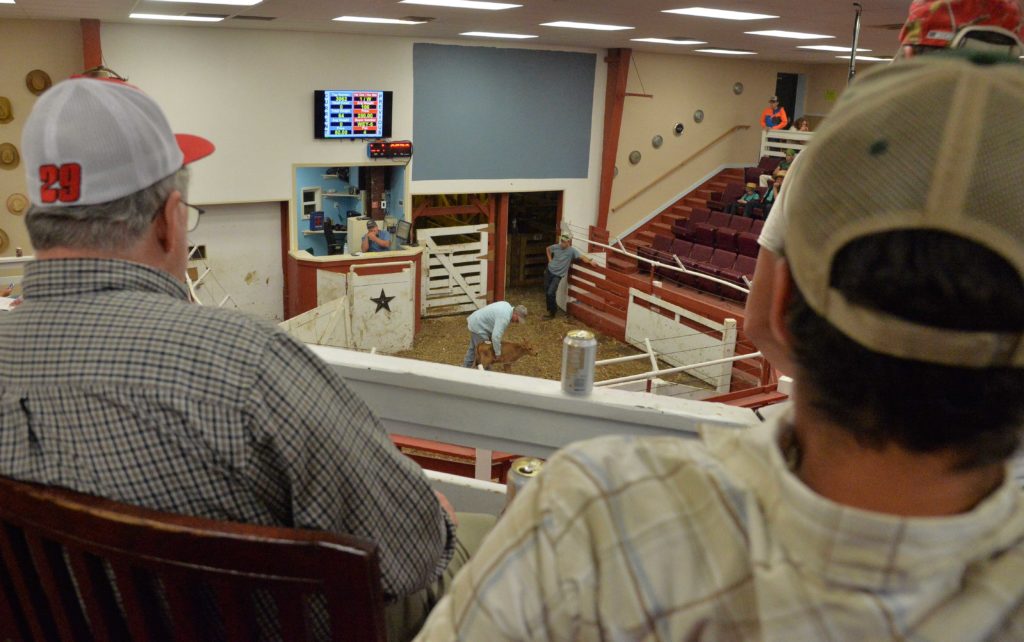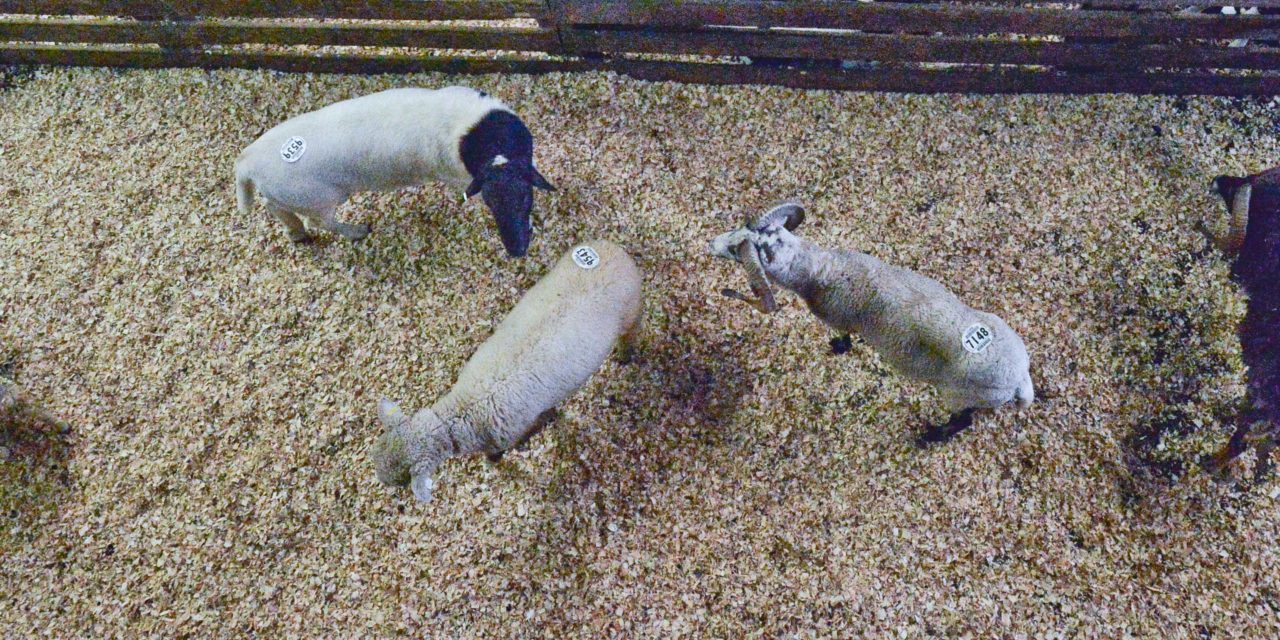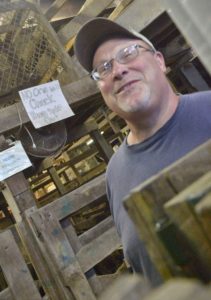
J.R. Raulerson, livestock handler, leads a calf across the auction ring as auctioneer Wendell Grove opens the bidding.
The Bidding Starts at Westminster’s Livestock Auction
by David P. Greisman photography by Phil Grout
Carroll County’s lone livestock auction no longer has as prominent a location as it did 80 years ago, when it was founded in downtown Westminster. It nevertheless plays as important a role now as it did then.
Buyers and sellers alike say that the unassuming two-story building just off Md. 31 is where they can go to get a fair deal.
“I can guarantee my money here,” said George Halterman, who raises beef cattle and goats in Carroll and Howard counties. “When somebody comes to the farm, they haggle.”
The promise of favorable prices was why Tom and Pat Johann traveled up the road from Woodsboro on a Tuesday in October until they crossed the narrow bridge leading to Westminster Livestock Auction and Auction Services. The Johanns had six young Boer goats they wanted to sell before winter — Bobby, Clyde, Red and three others without names. That night was the weekly large livestock sale. These six animals, like the other 182 cows, goats, pigs and sheep there, would find buyers by the end of the evening.
Tom and Pat got their check days later. The smallest goats went for $35 and $42.50. Their best sale had brought in $255. After fees, they pulled in $643.
“I was very pleased,” Tom said.
The auctions cater to a variety of buyers and sellers. Tuesdays are for larger animals, while Thursdays are for smaller creatures like poultry and rabbits, plus produce and plants. Additional auctions are held throughout the week for hay and straw, homemade goods, farm machinery and numerous other items. There are backyard farmers and people with anywhere from a handful of acres to larger plots of land.
They all come to an institution that was closed for about a year before reopening in early 2015. A fire did hundreds of dollars in damage and led to more than $1 million in rebuilding and improvements. The next closest auctions are in Hagerstown and in Greencastle, Pa. When the blaze shut down Westminster’s bidding room, regular buyer Boyd Beegle of Everett, Pa., still came there to purchase livestock from those who couldn’t make longer drives.
There’s still a local feeling at the auction, even if there are some who come from much farther away. Owners Earl and Victoria Gouker grew up on farms in the area and own one now. Victoria, 47, has worked at the auction since she was a teen, and later ran the restaurant there. When she and Earl, 48, purchased the auction in 2011, it wasn’t just for the sake of business, though the owners do of course get a cut of each sale.
Beyond that, acquiring the auction “was for the agricultural industry,” Earl said. “It was to keep the auction in Carroll County and keep a place for the farmers to sell their stuff.”
Among the 75 people in the bidding room on that October evening was Roger Bankert, who had hauled animals there for his neighbors in Hanover, Pa., and stayed in hope of buying cows in the 600-pound range to raise for beef.
Bankert remained there for the duration. Calves are first, then goats, sheep, pigs and, finally, larger cows. There’s a lot to see in one night, never mind one week. While some people visit occasionally, others are there each Tuesday.
“If you come just once in a while, you only see whatever is brought that day. But if you come every week, you never miss anything,” said Jason Plitt, a 25-year-old Manchester resident with eight acres for cattle and a couple of goats. On that day he wanted suitable calves at a good price for his girlfriend to raise.
Plitt got there a bit before the auction began. Livestock were dropped off over the course of the day, and some buyers arrived early to look at what would be up for sale later. Employees tagged and logged information about each animal and their owners. One ewe tried to evade the staff, running away and around its temporary pen.
“She wants to go home,” a woman said, as animals mooed and bleated elsewhere. “Back on that trailer.”
Around 6 p.m., a projector screen in the bidding room that had been showing the television series “Yukon Men” was switched off. Buyers settled in, some on the 150 cushioned stadium-style seats, and the rest behind them at high chairs and restaurant tables. A few snacked on fare from The Stock Pen. They all looked downward over a red fence as the livestock came out.
Stanley Burdette was there to buy for his sons and daughter, who had taken over the family’s butcher shop in Mount Airy. He wanted goats to sell to their increasingly multicultural customers. A Muslim holiday was coming up, and the animals would be used for sacrifices.
A wall-mounted television showed weights for the current animal, and the weight and price of the one bought immediately beforehand. Livestock are bought either by the pound or by the head. They almost always were sold one by one, with JR Raulerson leading them around and guiding them out, some needing more urging to leave than others.
“They could not get any other sucker to do this,” joked Raulerson, who has worked Tuesdays at the auction since spring 2015.
Like most auctioneers, Wendell Grove rattled prices off rapidly, looking around the room for the slightest nod of a head or lift of a finger. Grove often directed his eyes toward Jeff Weikert of Fairfield, Pa., who dominated significant portions of the auction acquiring cows that would promptly go to slaughter. Other regular winners were there to bid on behalf of clients seeking animals of specified breeds and weights.
Buyers switched between quietly commenting on the health and quality of the livestock and loudly teasing their bidding counterparts.
“Your truck ain’t full yet?” one man shouted across the room.
“I like to run half-loaded. That way I don’t have to pull so hard,” his target responded.
The crowd thinned out as the auction moved from one type of animal to another. Successful buyers paid up, loaded up and then hauled out.
Plitt didn’t get a calf for his girlfriend. Bankert went home without a 600-pound cow. Burdette, meanwhile, left that night with 10 goats.
“I was looking for more, but that’s a good amount of what I wanted,” he said afterward.
Then again, Burdette and others weren’t there merely for the animals, even if buying was his primary interest.
“There’s camaraderie, seeing the same people every week, picking on the same guys,” he said. “It sounds stupid, but it’s like a fun night out.”
 The two most important groups of people at the Westminster Livestock Auction are, of course, the sellers and the buyers. But two of the most visible people are auctioneer Wendell Grove and a man named JR Raulerson, who plays an interesting, potentially dangerous and quite pivotal role.
The two most important groups of people at the Westminster Livestock Auction are, of course, the sellers and the buyers. But two of the most visible people are auctioneer Wendell Grove and a man named JR Raulerson, who plays an interesting, potentially dangerous and quite pivotal role.
It is Raulerson who works in the selling ring on Tuesdays, guiding the livestock around in front of bidders. That part of the job can sometimes pale in comparison to what comes afterward: convincing the animal to leave.
“That’s a dangerous spot in the ring,” the 53-year-old Taneytown resident said one evening after expertly preventing close calls from the small handful of stubborn animals that had been up for sale. But he’d been on the job since spring 2015 and hadn’t made it through his first half year unscathed.
“See the scars on my hands?” he said. “Thirty-three stitches on that post over there.”
The wound came while working around a large cow. But while he jokingly refers to himself as the sucker who took the job, Raulerson has been around large livestock all of his life. He grew up on 65,000 acres in Florida, was a professional bull rider and continues to work with cattle and horses. He’s also a board member of the Maryland High School Rodeo Association.
That experience is key when it comes to seeing how to handle the animals in the ring.
“You see their body language when they come walking in,” he said. “Some are more relaxed. If they come running in and tearing up things, you know they’re going to be a handful. This is the first time that they’ve been taken out from the farm. They’re afraid, and you’ve got to just be relaxed around them and be calm.”
Raulerson was able to lead the youngest of calves with just his fingers. Other livestock only required a bit of walking toward them to herd them toward the exit. He also is equipped with a thin rod called a sorting stick. “Basically you’re just touching,” he said. “Sometimes I lightly touch. Sometimes I have to do it harder.”
And sometimes he needs to use a wooden barrier area in front of the auctioneer to protect himself.
“You got to be smarter than the animal,” one bidder in attendance said on a Tuesday night.
“There’s going to be a problem, then,” responded another.
Raulerson went home fine, without any additional scars but with a couple of young goats he’d picked up at the auction.
“Nobody was going to buy them, and I’m a sucker for buying stuff that needs a little bit of help,” he said. “Once I nurse them back to health, then I’ll bring them back in and resell them.”


